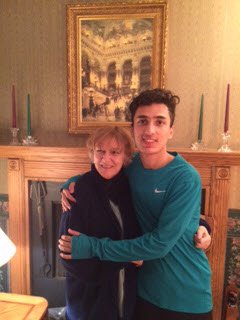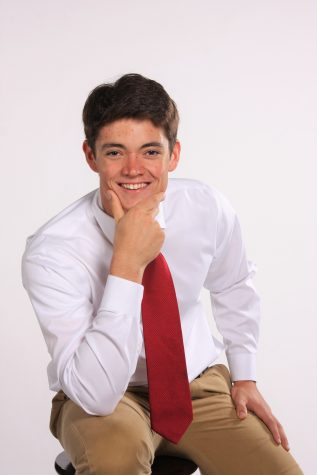Love and Unity: A Message for All Saeeds of the World
The Oakton community reflects on the visit of exchange student Saryal Saeed, his impact on the people around him, and his unshakeable vision for a more unified world.

(photo courtesy Inge Pisano)
When news struck of the tragedy that passed in an Orlando nightclub earlier this month, a cocktail of emotions was incited in people around the world.
Most decried the hate and ostracizing sentiments that remain attached to the gay community. Some called out the media for its obsessive portrayal of extremist Islamic terrorism. Others still argued for a reform of immigration policies to keep out people from the Middle East.
These various claims – equally polarizing as they were prevalent – found themselves plastered across the globe on social media sites, in the news, and in day to day conversations. Even in the aftermath of such an abhorrent event as the most costly mass shooting in American history – an event that, in a different political climate, would serve to mend divise wounds – people were remaining divided, embittered, and, to a large degree, anti-Muslim.
On the Monday following the attack, though, at least one message was delivered on the incident which insinuated hope for a more united future.
Its messenger: a lanky, 17-year-old, Pakistani teenager named Saryal Saeed, a young man whose expansive worldview carries heft beyond his years. A young man whose own experiences in America, as an exchange student at Oakton High School, in the Muslim world, and in the shadow of a society that distrusts people of his Pakistani background have helped him shape a message which he still boils down into three simple words: “love and unity.”
Having barely returned to his home country of Pakistan in the days preceding the Orlando incident (on the heels of a goodwill exchange program in the United States, no less) Saeed felt compelled to email his chief American mentor as soon as he was made aware of the attacks. Informing Madame Inge Pisano, his former French teacher, of the shock which the incident sparked inside of him, Saeed spoke in poignant outrage towards the un-Muslim and inhumane nature of the shooter.
“I was shocked,” wrote Saeed. “It was such a brutal act by a person who shouldn’t be called a Muslim; not even a human.”
Elaborating on the large scale implications of the shooting, Saeed’s email also lamented the societal costs of these events: “I am so sorry that we people have failed to realize that nobody and nothing is safe in the world and we should all become united[sic].”
Impressively altruistic all its own, this sort of response was simply expected by the people who knew Saeed while he was in the United States. For those closest to him, in fact, the ideals he expounded carried more than their mere meaning, however deep: Saeed’s ideas were also characterized by the power to transform.
“Saryal always had such an impact on people,” said Madame Pisano, the goodnatured Oakton French teacher who was among the first to take Saeed under their wing during his time in America. “He always reminded us of his most important message, which was one of universal love.”
Saeed would be happy to know that Pisano felt that way, too.
In an interview that the Outlook conducted with Saeed in the days before his departure from America, he emphasized the importance of his message to his motives for traveling to the United States. “The program [that helped me travel here] is really about one thing: sharing love,” Saeed said. “It doesn’t matter what religion you are, or what your culture is. As humans we need to promote sharing love and unity.”
That love of which Saeed spoke, so central to his core beliefs, also seeped into his daily life. “Saryal is just a really friendly person,” Pisano said in her interview. “He loved to talk to people, and he always had a very positive outlook.”
Saeed’s American friends spoke highly of his personality and charismatic nature. Luke Amaral, a current rising senior at Oakton who spent many weekends hanging out with Saeed, had nothing but positive commentary on the Pakistani visitor. When asked to describe Saeed, Amaral referred to his friend as “an outgoing and funny man” who “taught [people] that good times and friendship can transcend any cultural barriers.”
One instance of this knack for a good time came when Saeed visited the home of Madame Pisano, who had invited him over for dinner one night so he could meet another American family.
As they were enjoying their meal, Pisano’s daughter asked her dad if she could get up and sing for their guest. “Being a music family,” as Pisano mentioned, the father obliged, but as a joke also asked Saeed: “Saryal, would you like to sing?”
To the family’s surprise, he most certainly did, and spent the rest of the evening entertaining his hosts with countless songs in his mother tongue of Urdu.
For students at Oakton, who have already heard his singing first hand in his performance at this spring’s cultural festival, Saeed’s musical abilities are no longer any secret. For the hospitable French teacher, though, his spontaneous performance created a memory that she still holds dear. “It was such a fun surprise,” Pisano said. “We all enjoyed his lovely voice, and we wound up having such an incredible time.”
Saeed’s fun-loving nature also led him to have some of his most memorable experiences in the United States. Cate Mustain, another rising senior who was friends with Saeed, gushed about his open-mindedness and friendly demeanor. “He was so brave coming to America and being so open to all these new things…he always wanted to jump on in with all these new things.”
When Mustain recollected on her favorite memories with Saeed for instance, she immediately thought back to his “legendary” promposal that wound up earning him a date to the dance. “When he first came here,” Mustain said, “he was confused on what some things even were, like homecoming and prom and the ‘typical’ American high school experience. But by the end of the year, he worked up the courage to ask [a girl] to prom, and his poster was hilarious too!”
Saeed’s involvement in the Oakton community, in activities such as making his prom poster (which notoriously read: “I have traveled 7311 miles to take you to prom, so don’t Paki-stand me up”) and delivering in the school’s morning announcements, helped him to create the cultural awareness he hoped to develop by coming to the United States.
“The [Kennedy-Lugar] YES program, which helped me to come here, has the main purpose of removing misunderstandings and boosting cultural ties,” Saeed said. “But to really get to know someone, you have to adopt things from their culture.”
When asked about some of the other things that he had adopted during his time in the States, Saeed couldn’t help but display his passion as he described the diversity he saw in American culture.
“People around the globe always say the United States has no culture, but that is simply not true,” Saeed said. “This country is made up of all the cultures. Some people listen to rap music, others to country. There are people from all the world cultures here; the USA gave me the opportunity to see others of different backgrounds and learn from them.”
For Saeed, this experience was one of the most important that he had in America, because it stood in such sharp contrast to the culture he was used to in Pakistan. In describing his home country, which is made up of over 96% Muslims, Saeed referred to things all being the same, what with “the same news, the same religion, and mostly the same people” comprising his entire home culture.
On the other hand, Saeed described the American experience as much more cosmopolitan and generally diverse. “In the United States,” he said, “you see people of all different cultures, and they’re all friends with each others. Hispanics are friends with Asians. Asians are friends with whites. Blacks are friends with whites. They’re together all around.”
Accounting for the differences in these cultural norms, though, Saeed has a very optimistic vision for the future of diversity in his home country. “It’s sad that more people don’t come to see Pakistan,” Saeed lamented. “Due to the fear of terrorism, and a lack of global business coming to our borders, people from around the world don’t move to Pakistan like they do to the United States. If they came though, they would see. We can live together; we can do this.”
Among the people who have most recently traveled to Pakistan though is Saeed himself, and as he prepared for his journey home he commented on some of the pressures he was prepared to face. “My countrymen now expect big things from me: maturity, responsibility, etc. And they should! I got to have this experience, now I need to do something with it!”
Saeed also shared some of the ways he now plans to fulfill those responsibilities, and how his experience in America helped open his eyes to his future calling.
“I hope to have a career in human development organizations,” Saeed said. “I want to help people, bring them together, and teach them as global citizens. I want to bring these programs and this help into the rural villages of Pakistan.”
Few would expect such clear cut and selfless vision among people as young as Saeed, but then again expectations are what the Pakistani teen set out to shatter in the first place. “If I learned one thing here,” Saeed said as he prepared to raise his voice to a sonic volume, “NEVER, EVER have too many expectations. I came to America with some, and people here had some about me too, but they were mostly broken. You can’t expect too much.”
Expectations aside, Saeed still described his life in America as “an experience that made [him] grow mentally and open [his] mind.” Such a transition has been critical for Saeed, allowing him to also “think more positively about the people in the world.” Especially as the global community grapples with such divisive issues as gun control, immigration, and the rights of the LGBTQ community, an open and optimistic mind could be more important than ever.
In the eyes of the Oakton students who knew Saeed, though, the impact of his philosophy has already affected the ways they live their lives. For Mustain, it meant “learning to be more brave and open to new things.” For Amaral, it went so far as to encourage him to plan a gap year, “especially after getting to know Saryal and hearing about his study abroad experience.”
Even for other classmates who didn’t know him as well, such as rising senior Shiling Zhao, his impact had the simple effect of brightening their days and school years. “Saryal!” Zhao exclaimed. “He always made class so much more fun and happy.”
After hearing that he was leaving back to Pakistan, Zhao was struck with a question that has plagued many of Saeed’s peers since his departure: “Where is Saryal?”
Considering the footprint he’s already left though, along with his lofty plans for a more unified world, perhaps a better question to ask is “Where isn’t Saryal?”

Ethan has served on the Outlook for 3 years, (formerly as a staff writer and news editor) and currently leads the publication as Editor-in-Chief. With...






Smithe303 | Nov 9, 2016 at 2:17 am
I do believe all of the ideas you’ve offered for your post. They are really convincing and will definitely work. Still, the posts are very quick for newbies. May just you please extend them a little from next time? Thank you for the post. eedeecedeeeddfek
Smitha127 | Nov 6, 2016 at 3:17 am
In fact when someone doesnt understand then its up to other visitors that they will help, so here it takes place. dedkbdgddcfcdcea